We see many people with too much stress at our NeurOptimal® neurofeedback centers. They come to us because they--or their spouse, boss, or doctor--feel that they need to get a handle on their stress. Oftentimes, people don't realize how detrimental mounting stress is to their wellness. Uncontrolled stress affects health, relationships, work performance, and overall contentment with life. Studies show that 90% of primary care doctors' office visits are stress-related! We've compiled this list of signs you want to pay attention to if wellness is your priority. Some will surprise you!
Quick links:
How do you Identify if you have too much stress?
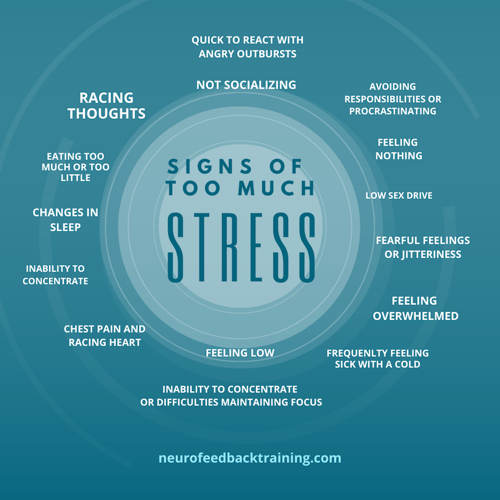
Stress can sneak up on you slowly. There is an urban myth of a frog who is slowly boiled and forgets to jump out of the water before it reaches dangerous temperatures. Just like the frog, we often forget to take care of ourselves before becoming overwhelmed. Sometimes, we only find out when catastrophes happen, such as screaming at our boss and being fired or surviving a stress-related heart attack.
The good news is that there are ways to avoid letting it go too far. The first step is becoming aware of ourselves- internally in terms of feelings, thoughts, and sensations and externally in how we behave- and our surroundings. Take a moment to check on yourself for these signs of stress.
The 4 Signs of Too Much Stress
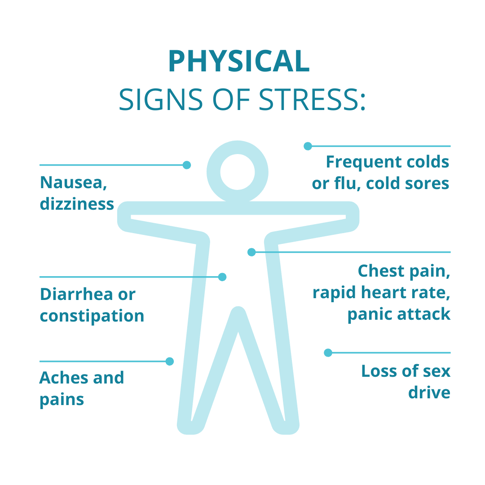 1. Physical Signs
1. Physical Signs
We often think of physical symptoms as being caused by some health issue and not by being mentally or emotionally overwhelmed. But our body often tries to tell us about how we feel psychologically. If you have some of these physical issues, it may be a sign you're under too much stress, and you must address that. Managing your stress better can help you alleviate these symptoms:
- Headaches. These usually take the form of tension headaches. We don't often think about why we have a headache; we just reach for the Advil and rush into our next activity. But regular headaches can be a sign of too much stress.
- Stomach troubles. Indigestion, bloating, constipation, and diarrhea, can be caused by stress, and often it is after all other causes are ruled out that doctors ask us about stressors.
- Frequent flu or colds. Studies show chronic stress lowers immune system functioning.
- Chest pain and racing heart. In our center, we've had a number of neurofeedback clients come to us because their cardiologist or ER doc told them their "heart attack" was actually stress-induced.
- Low sex drive. People often look to their partner as the source of this problem: "I'm no longer attracted to her/him." The real issue is that low energy and low sex drive are from stress--and not how sexy their partner is! We've seen many neurofeedback clients organically reconnect with their partners after they took charge of managing their stress.
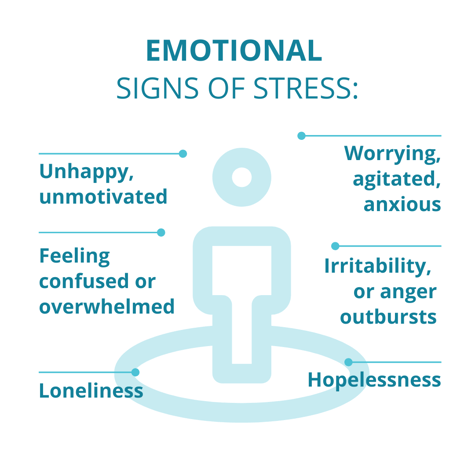
2. Mental / Cognitive Signs
Your mind is a pill! You can have thoughts that are stressful or thoughts that de-stress, but the first step is to notice what kind of thoughts you're having. That can help you assess how much stress affects your thinking. Here are the top cognitive signs of stress:
- Negative thoughts. Take a moment and just review what kinds of thoughts you have had over the last 10 minutes, the last hour, or the last day. Are most of them negative? We can look at issues from the glass half-full or half-empty, which angle are you taking?
- Racing thoughts. How fast are they moving? So fast that you can't create a gap to notice them? One of the most valuable skills in managing your stress is to separate yourself from racing thoughts. Take time to actually look at them critically instead of letting them consume or define you.
- Worrier? Connected to the first point. Do you find yourself actively worrying all the time? This could go wrong, that is bad, this isn't right...and find it endless? This is a sure sign of needing to find inner calm.
- Inability to concentrate or difficulties maintaining focus. Related to racing thoughts, if the speed of your mind is revved up, you may have difficulty focusing on one topic or staying on topic. If you're over 60 you may immediately think that you are experiencing cognitive decline from aging, but it might be that you have too much stress in your life. (Memory problems are another sign of stress.)
- Performance anxiety at work. No one likes public speaking, whether it's giving presentations to clients or speaking in front of large groups. But if your anxiety around public speaking has spiked, it may be a sign you're under too much stress. Read more on helping performance anxiety.
Related
3. Behavioral Signs
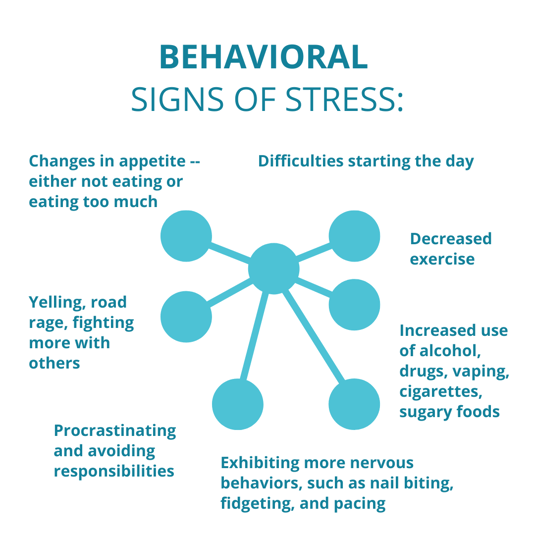 If we're unaware of our thoughts and emotions, sometimes looking at our behaviors can be a helpful way to see if we're stressed out. Here are the top behaviors connected to stress:
If we're unaware of our thoughts and emotions, sometimes looking at our behaviors can be a helpful way to see if we're stressed out. Here are the top behaviors connected to stress:
- Eating too much or too little. Some people overeat, especially comfort foods such as sweets and junk foods, and others do the exact opposite and lose their appetites when they are experiencing too much stress. Has your weight gone up or down?
- Changes in sleep. Not feeling rested, getting less than 6 hours of sleep, finding it difficult to feel relaxed enough at the end of the day to sleep, or "crashing", waking up in front of the TV at 2 AM. For some, oversleeping is a sign of stress. It's connected with wanting to avoid life.
- Not socializing. When we can't relax, we often avoid social situations and instead choose activities that numb us--binge-watching TV, playing video games, or eating comfort foods alone.
- Socializing but having the focus be mood-altering substances such as alcohol, pot, nicotine-related products, or highly distracting activities such as gaming.
- Avoiding responsibilities or procrastinating. You may know that doing these things would be easier than avoiding them, yet you find yourself delaying them.
- Relying on alcohol or pot to relax daily. Here's a list of signs that your alcohol or weed usage is headed in the direction of abuse.
4. Emotional Signs
We all have emotional ups and downs, but if we find that we're staying in the extremes of these emotions, it can be a sign that stress is making us emotionally stuck. Here are the emotions to watch out for and if you feel them daily, have a hard time shifting out of them, or find they interfere with connecting with others, it is a strong sign that you're feeling overwhelmed..png?width=450&height=377&name=THE%20STRESS%20RESPONSE%20-%203%20zones-fight-flight%20(1).png)
- Feeling down or sad. Especially if there isn't a definable reason.
- Quick to react with angry outbursts. Are people "staying clear" of you? Calling you hot-headed or saying you have "anger issues?" We often want to blame others but often, these feelings are a sign that we're too stressed and not coping well, rather than be caused by external events or people.
- Fearful feelings or jitteriness. This often goes hand-in-hand with worrying thoughts.
- Feeling overwhelmed. This can lead to us isolating ourselves.
- Feeling nothing. Feeling disengaged or not caring about things people normally care about: friends, hobbies, doing a good job at work, or engaging in community activities.
What reduces Stress?
Here are a few tips to start combatting stressing today:
-
/woman-meditating-outdoors.png?width=417&name=woman-meditating-outdoors.png)
Take a few moments throughout the day and breath deeply for one minute, 20 breaths. Why? The slower, deeper breath is what the body does when it's in a state of relaxation, so when you force a deeper breath you are nudging your brain to recognize that it can shift out of stress and into relaxation.
- Get your heart rate up. Engaging in cardio exercise such as high intensity interval training (HIIT) a few times a week. And it doesn't need to be more than a 30 minute commitment from start to finish. HIIT has been shown to be as effective when done for 20 minutes as when someone does 50 minutes of running.
- Hug someone you care about and encourage yourself to feel it!
- Work on your nighttime sleep ritual. Remember how you were put to bed as a child? That is what needs to happen as an adult. (You can switch out Good Night Moon for a novel so long as it's not a crime drama!) And download our e-book on getting a good night's rest:
How Neurofeedback Helps: Neurofeedback for Stress Management
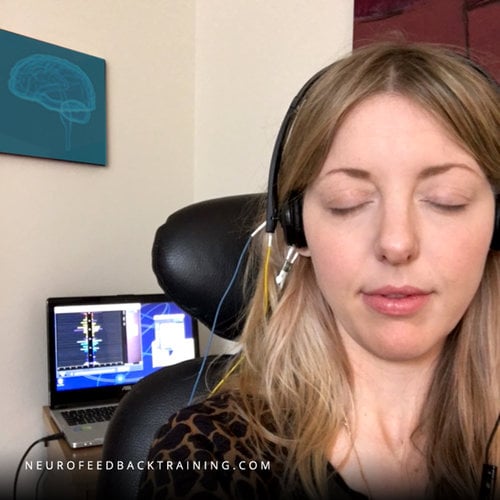 Successfully managing stress involves understanding that multiple systems are involved, such as mental habits, and behavioral and brain habits, and engaging changes in as many areas as possible. When deciding on how best to start de-stressing if the dominant feeling is overwhelming, starting with tools that create calm and a sense of clarity are recommended first go-to's. When you are calm and clear then you can come up with an action plan.
Successfully managing stress involves understanding that multiple systems are involved, such as mental habits, and behavioral and brain habits, and engaging changes in as many areas as possible. When deciding on how best to start de-stressing if the dominant feeling is overwhelming, starting with tools that create calm and a sense of clarity are recommended first go-to's. When you are calm and clear then you can come up with an action plan.
For some people, neurofeedback training is a good tool for creating calm and focus, interrupting and resetting brain habits.
Neurofeedback is a useful tool in combating stress and goes right to the heart of how your brain responds to stressors. Neurofeedback helps our clients reduce stress by working directly with the central nervous system to help them relax, and then be able to focus and come up with a plan for each area of their lifestyle that could benefit from changing.